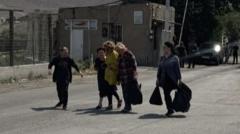Is Regime Change Driving Iranians to Flee Across Borders?

Understanding the Current Sentiment in Iran: A Perspective from the Borders
The ongoing tensions surrounding Iran have prompted a variety of responses from its citizens, especially in light of recent military actions and political rhetoric. As dual nationals like Mariam and her husband cross the border into Armenia, they carry with them not just heavy suitcases but also heavy hearts filled with uncertainty about their homeland. This article delves into the complex emotions and sentiments of Iranians amid the backdrop of potential regime change, military interventions, and the evolving geopolitical landscape.
The Landscape of Discontent
The mood inside Iran is a mixture of anxiety and resilience. Mariam's words, "People want regime change," encapsulate a growing sentiment among many citizens who have expressed frustration with the current government. However, this desire for change is nuanced, as not all citizens agree on the means to achieve it. The political atmosphere in Iran is characterized by:
- Polarization: While many desire change, there are still significant factions within the country that support the existing regime. This division complicates any potential movement toward reform.
- Fear and Uncertainty: With the Iranian government maintaining tight control over information and dissent, many citizens are afraid to voice their true feelings, fearing repercussions for themselves and their families.
- Resilience: Despite challenges, life in many parts of Iran continues with businesses operating and communities functioning, indicating a level of resilience among the populace.
The Impact of Military Actions
The recent military actions by the United States, including the bombing of Iranian nuclear sites, have intensified discussions about regime change. President Trump's rhetoric has given rise to a sense of urgency among some citizens, as illustrated by the father who expressed his willingness to embrace external military intervention for the sake of change. The following factors are critical in understanding the impact of such military actions:
- Escalation of Conflict: Military strikes can escalate tensions between nations, leading to heightened fears both domestically and internationally.
- Potential for Exile: As citizens weigh their options, the idea of leaving Iran becomes more appealing, especially for those with dual citizenship or the means to seek refuge abroad.
- Mixed Reactions: While some support the military intervention, others see it as a foreign imposition that could lead to further suffering for the Iranian people.
Crossing Borders: A Glimpse into Displacement
The Agarak border crossing serves as a vital link between Iran and Armenia. Here, the experiences of those fleeing Iran highlight the complex realities faced by many. Individuals like Alenoosh, who have roots in both countries, express a deep connection to their homeland while also acknowledging the dire circumstances that have led many to seek safety elsewhere.
The Human Stories Behind the Numbers
The stories of those departing Iran provide a human face to the statistics often reported in the media. A Canadian diplomat noted an increase in arrivals at the border, hinting at a potential trend of displacement. Yet, this does not equate to a mass exodus. Factors influencing individual decisions to leave include:
- Personal Safety: Many individuals are motivated by a desire to protect their families from potential violence or repression.
- Quality of Life: The prospect of a better life abroad drives many to seek asylum, especially in nations where freedoms are more respected.
- Emotional Toll: The psychological impact of living in a state of fear and uncertainty can lead to a strong desire to escape, even if the journey is fraught with challenges.
The Role of Dual Nationals
Many of the voices heard at the border are from dual nationals, whose perspectives often differ from those of single-nationality citizens. They may possess the financial means and legal pathways to leave, contrasting sharply with the experiences of ordinary Iranians who lack such options. This raises questions about the overall representativeness of their sentiments:
The Complexity of Identity
For dual nationals, the intersection of identity and nationality adds layers to their experiences. Factors affecting their viewpoints include:
- Access to Information: Dual nationals may have a broader understanding of international perspectives, influencing their opinions on regime change and military intervention.
- Emotional Connection: Many retain strong ties to their Iranian roots while also feeling the benefits of life in their adopted countries.
- Responsibility and Advocacy: Some feel a moral obligation to advocate for change in Iran, leveraging their status to raise awareness about the plight of those still living there.
Voices of Hope and Despair
Amidst the chaos, there are voices of hope and despair. The narratives collected at the border reveal a landscape of emotions, from fear and frustration to hope for a better future. As we listen to these stories, it becomes clear that the desire for change is not just about politics; it is also deeply personal.
The Dichotomy of Hope and Reality
For many, the hope for regime change is intertwined with the harsh realities of life in Iran. The man who expressed his willingness to sacrifice for change represents a growing frustration with the status quo, yet his sentiments are met with caution by others who fear the consequences of military intervention.
- Hope for Change: Many hold onto the belief that change is possible, whether through internal reform or external pressure.
- Cautious Optimism: Some believe that the international community's involvement could lead to positive outcomes, while others remain skeptical.
- Despair Over Current Conditions: The ongoing struggles faced by ordinary citizens foster a sense of hopelessness, leading some to seek immediate escape rather than long-term solutions.
The Future of Iran: Uncertain but Intriguing
The future of Iran remains uncertain as political, military, and social dynamics continue to evolve. The decisions made by world leaders, particularly in the United States, will play a crucial role in shaping the landscape for Iranian citizens. As we reflect on the stories shared at the border, several key themes emerge:
The Role of International Relations
International relations will undoubtedly impact the fate of Iran. The interplay between military action and diplomatic efforts will dictate how the situation unfolds. Factors to consider include:
- Diplomatic Solutions: Engaging in dialogue may offer pathways to stability, reducing the need for military intervention.
- Support for Activists: The international community's support for Iranian activists could bolster internal movements for change.
- Humanitarian Considerations: The plight of those fleeing conflict necessitates a compassionate response from other nations.
Conclusion: A Call to Reflect on the Human Experience
The situation in Iran is multifaceted, filled with complexities that reflect the human experience. As citizens navigate their feelings of hope and despair, the international community must remain vigilant and compassionate. Understanding the narratives of those impacted by these dynamics can foster empathy and awareness, encouraging a more nuanced approach to foreign policy.
What does the future hold for the people of Iran? As global citizens, it is our responsibility to stay informed and engaged. How can we support those striving for a better future while recognizing the complexities of their experiences? #Iran #RegimeChange #HumanRights
Frequently Asked Questions
What are the main reasons behind the desire for regime change in Iran?
Many Iranians express discontent with the current regime due to issues like political repression, economic hardship, and lack of personal freedoms.
How do military actions impact the sentiments of Iranian citizens?
Military actions can heighten fears of violence, evoke strong emotions about national sovereignty, and influence individuals' decisions to leave the country.
What role do dual nationals play in the narrative of Iran’s future?
Dual nationals often have unique perspectives that blend experiences from both their home and adopted countries, influencing their views on regime change and potential interventions.
Published: 2025-06-23 16:24:03 | Category: technology


